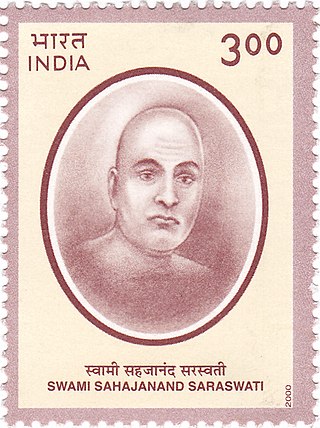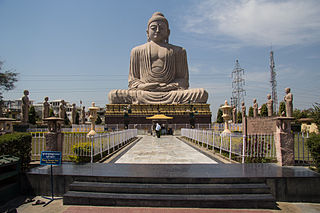
Bihar is a state in eastern India. It is the third largest state by population, the 12th largest by area, and the 14th largest by GDP in 2021. Bihar borders Uttar Pradesh to its west, Nepal to the north, the northern part of West Bengal to the east, and with Jharkhand to the south. The Bihar plain is split by the river Ganges, which flows from west to east.

Sahajanand Saraswati (pronunciation was an ascetic, a nationalist and a peasant leader of India. Although born in United Provinces, his social and political activities focussed mostly on Bihar in the initial days, and gradually spread to the rest of India with the formation of the All India Kisan Sabha. He had set up an ashram at Bihta, near Patna ,Bihar carried out most of his work in the later part of his life from there. He was an intellectual, prolific writer, social reformer and revolutionary.

Jayanta Mahapatra is an Indian English poet. He is the first Indian poet to win a Sahitya Akademi award for English poetry. He is the author of poems such as "Indian Summer" and "Hunger", which are regarded as classics in modern Indian English literature. He was awarded a Padma Shri, the fourth highest civilian honour in India in 2009. He returned the award in 2015 to protest against rising intolerance in India.

Anil Agarwal is an Indian billionaire businessman who is the founder and chairman of Vedanta Resources Limited. He controls Vedanta Resources through Volcan Investments, a holding vehicle with a 100% stake in the business. Agarwal's family have a net worth of $4 billion.

Anand Kumar is an Indian Mathematics educator, best known for his Super 30 programme, which he started in Patna, Bihar in 2002, known for coaching underprivileged students for JEE- Main & JEE-Advanced, the entrance examination for the Indian Institutes of Technology (IITs). Kumar was named in Time magazine's list of Best of Asia 2010. In 2023, he was awarded the Padma Shri, country's fourth highest civilian award by the Government of India for his contributions in the field of literature and education.

Bindeshwar Pathak is an Indian sociologist and social entrepreneur. He is the founder of Sulabh International, an India-based social service organisation which works to promote human rights, environmental sanitation, non-conventional sources of energy, waste management and social reforms through education. He is the Brand Ambassador for Swachh Rail Mission of Indian Railways. His work is considered pioneering in social reform, especially in the field of sanitation and hygiene. He received various national and international awards for his work with this organisation. He was presented with the Lal Bahadur Shastri National Award for Excellence in Public Administration, Academics and Management for the year 2017. He was conferred with Padma Bhushan, India's third-highest civilian award in 1991.

The waste management in Switzerland is based on the polluter pays principle. Bin bags are taxed with pay-per-bag fees in three quarters of the communes. The recycling rate doubled in 20 years due to this strategy. The recycling rate for municipal solid waste exceeds 50 percent.

Papiya Ghosh was a historian of South Asian history and a professor of the University of Patna, Patna, India. She was found murdered on 3 December 2006, along with her elderly housemaid, Malti Devi, apparently as a result of an attempted burglary.
Vijay Mahajan is the Chief Executive Officer (CEO) of the Rajiv Gandhi Foundation and the Director of the Rajiv Gandhi Institute of Contemporary Studies.

The economy of Bihar is one of the fastest-growing in India. It is largely service-based, with a significant share of agricultural and industrial sectors. The GDP of the state was ₹7,45,310 crores at the current market price (2022–23).

A sanitation worker is a person responsible for cleaning, maintaining, operating, or emptying the equipment or technology at any step of the sanitation chain. This is the definition used in the narrower sense within the WASH sector. More broadly speaking, sanitation workers may also be involved in cleaning streets, parks, public spaces, sewers, stormwater drains, and public toilets. Another definition is: "The moment an individual’s waste is outsourced to another, it becomes sanitation work." Some organizations use the term specifically for municipal solid waste collectors, whereas others exclude the workers involved in management of solid waste sector from its definition.

Gram Vikas is an Indian non-governmental organisation based in Odisha, and founded in 1979. Gram Vikas works towards enabling rural communities to lead a dignified life. This is done by building capabilities of village communities, strengthening community institutions and mobilising resources. Gram Vikas works on six focus areas which are water, livelihoods, sanitation & hygiene, habitat & technologies, village institutions and education.

Waste management in Bangladesh faces many challenges due to its large, rapidly growing population in a densely populated country.

Patna Municipal Corporation (PMC) is the civic body that governs Patna, the capital of Bihar in India.Municipal Corporation mechanism in India was introduced during British Rule with formation of municipal corporation in Madras (Chennai) in 1688, later followed by municipal corporations in Bombay (Mumbai) and Calcutta (Kolkata) by 1762. Patna Municipal Corporation consists of democratically elected members, is headed by a Mayor, and administers the city's infrastructure, public services, and supplies.

Albina Ruiz Ríos is a Peruvian environmentalist, social activist and social entrepreneur serving as the minister of environment of Peru since 10 December 2022.

Goonj is a non-governmental organisation headquartered in New Delhi, India, that undertakes disaster relief, humanitarian aid and community development in parts of 23 states across India. Goonj focuses on clothing as a basic but unaddressed need.

Waste management in India falls under the purview of the Union Ministry of Environment, Forests and Climate Change (MoEF&CC). In 2016, this ministry released the Solid Wastage Management (SWM) Rules, which replaced by the Municipal Solid Waste Rules, and 2000 of which had been in place for 16 years. This national policy plays a significant role in the acknowledgement and inclusion of the informal sector into the waste management process for the first time.

MSTC Limited is a central public sector undertakings under the Ministry of Steel, Government of India. It is involved in diversified e-commerce services. Its corporate office is in Kolkata, West Bengal with regional branch offices in various other cities. The company reported a net profit of INR 112.95 crore for fiscal year 2020-21. Incorporated on 9 September 1964, MSTC has 344 employees.
The/Nudge Institute is an Indian non-profit organization. It was established in July 2015 in Bengaluru. The/Nudge exists to alleviate poverty, sustainably, collaboratively and at scale. It has three impact streams to tackle the complex issue of poverty from multiple angles – Centre for Skill Development and Entrepreneurship (CSDE), Centre for Social Innovation (CSI) & Centre for Rural Development (CRD).
Social entrepreneurship in South Asia involves business activities that have a social benefit, often for people at the bottom of the pyramid. It is an emerging area of entrepreneurship that is supported by both the public sector and the private sector.
















